For centuries, newspapers were the social media platform for many communities. Newspapers printed what residents wanted to read: news and events; births, marriages, and deaths; goings-on in courts; and other topics of social, political, cultural, and religious interest. In the process, unique details about the lives of many of your ancestors may have been preserved in newsprint.
Millions of historical newspaper pages are now being republished and made searchable online, turning old news into new discoveries for today’s researchers. The British Newspaper Archive is the premier online resource for old newspapers published in Wales, Scotland, Ireland, or England. Here’s what you should know about using the British Newspaper Archive for family history.
What Is The British Newspaper Archive?
The British Newspaper Archive (BNA) is a partnership between the British Library, which is the national library of the United Kingdom, and Findmypast, a leading genealogy subscription website. Nine years ago, the BNA launched an ambitious goal of bringing online up to 40 million historical newspaper pages from the British Library’s collection. They have just about reached their goal. On each of the nearly 40 million pages, articles from urban and rural newspapers from between 1800 and the 1950s—numbering in the hundreds of millions—are now available online, many for the first time.
The majority of newspaper pages in the BNA cover England, with a heavy concentration on densely-populated London. But you can also explore hundreds of thousands of articles from newspapers in Wales, Scotland, Northern Ireland, and Ireland too.
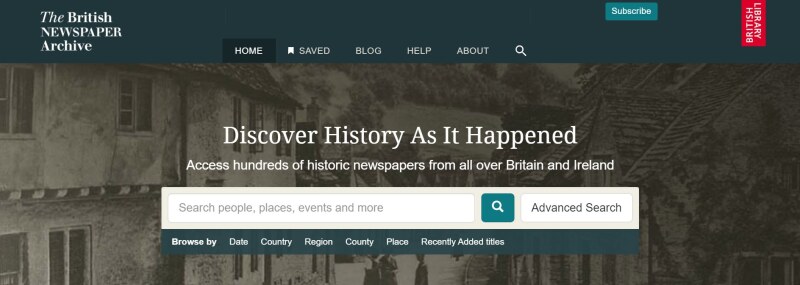
Using BNA for Family History
BNA divides digitized newspaper content into categories, several of which are especially relevant to genealogists:
- News articles (local and national)
- Family notices (births, marriages, deaths, engagements, anniversaries, and birthdays)
- Obituaries (life sketches of notable people who were recently deceased)
- Letters to the editor
- Advertisements
BNA subscribers may search for newspaper titles from a relative’s locale and browse them page-by-page. They also may search for specific names and keywords that appear in newspapers of a certain location, date (or date range), and title. The site uses optical character recognition technology to find possible matches. It is wise to use both methods—keyword searches and browsing the newspapers themselves—because either strategy may reveal (or miss) items you may want to read.

How to Access the British Newspaper Archive
Consider starting your BNA experience by entering a relative’s name in two free collections on FamilySearch.org: British Newspaper Archive, Family Notices and British Newspaper Archive, Obituaries. You may stumble upon the particulars of a relative’s birth, marriage, or death, along with the names of their close relatives. Here’s a clipping from the family notices section of a Northern Ireland paper published on 21 March 1870:
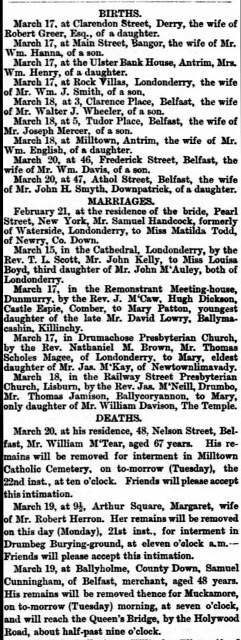
The millions of indexed names in these FamilySearch collections represent only a small fraction of names that appeared in newspapers now on the BNA website. That’s why it could be valuable to subscribe to the British Newspaper Archive or, if you’re a Findmypast subscriber, to explore their British and Irish newspaper collections, which are sourced from the BNA.
Only in the full BNA collections, for example, was I able to find the story of the untimely death of my distant cousin, 15-year-old Stanley McClelland of Idle, Bradford, England. His accidental drowning while on holiday in Wales was reported by multiple newspapers, including the Liverpool Daily Post and Mercury:
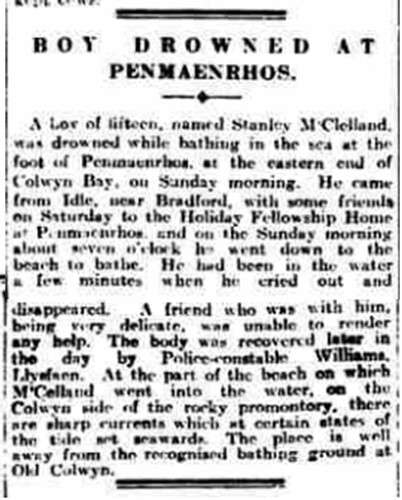
Three days later, another paper ran a detailed article on Stanley and included a poignant image and the identities of his relatives and friends:
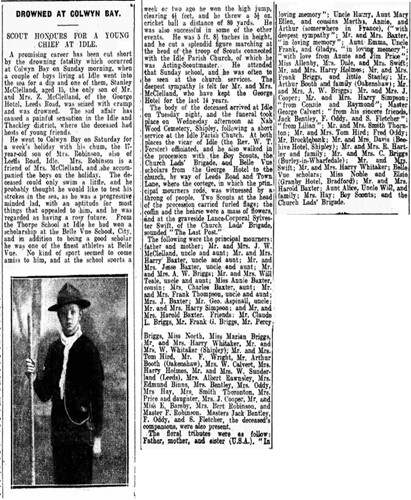
The sad story still hadn’t quite run its course. A week later, the same paper printed a letter from a relative of the boy who had tried to save Stanley’s life, recounting the story from the bereaved young friend’s point of view.
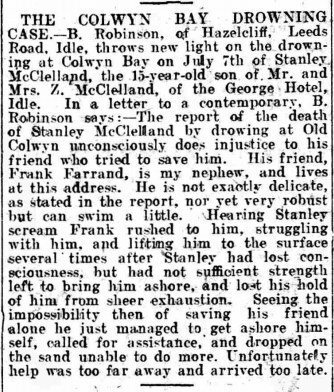
The story of Stanley’s death seems to have been lost to subsequent generations; it hadn’t appeared in family trees I’d seen. After discovering these articles in the BNA, I added them to his FamilySearch tree profile. (Here’s how to add sources found on other websites to FamilySearch tree profiles.)
Explore Your Family History on the BNA
Start discovering what The British Newspaper Archive may reveal about your family history in England, Ireland, Scotland, or Wales. Explore British Newspaper Archive, Family Notices and British Newspaper Archive, Obituaries for free on FamilySearch.org, or dive deeper into old newspapers at The British Newspaper Archive.


